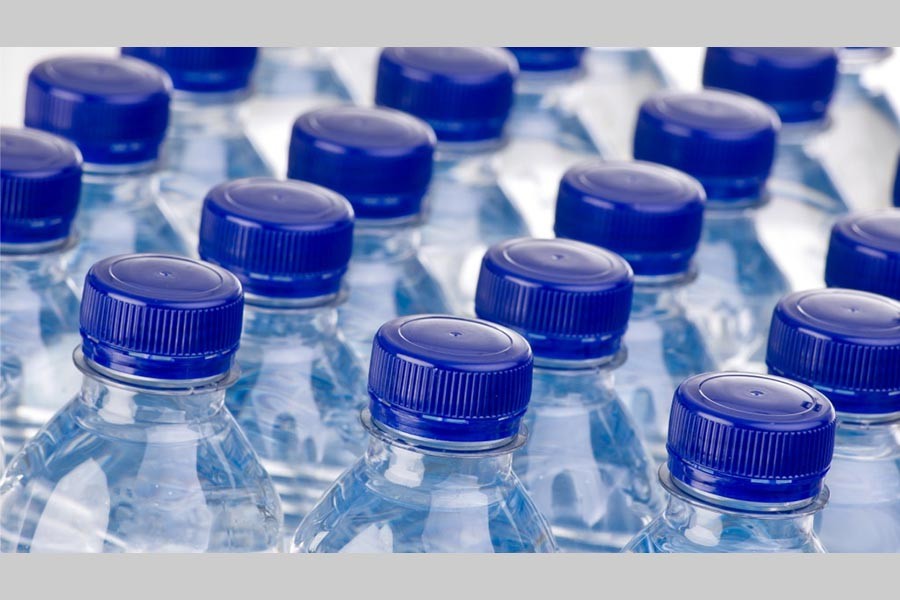
Published :
Updated :

The Bangladesh Agricultural Research Council (BARC) has of late made a sensational revelation regarding the quality of water different companies supply for drinking in and around Dhaka. According to the findings of the government study, 'coliform bacteria' has been found in 97 per cent of so-called filtered water supplied in jars to households, shops and offices in the capital city of Bangladesh. 'Coliform bacteria' is an organism that is present in environment and faeces of all warm-blooded animals and humans. It means the presence of pathogens from faeces of humans and animals is highly likely in such water being drunk by residents of Dhaka.
A team of BARC researchers determined the 'horrifying' data while studying the level of minerals in jars and bottled water marketed in Dhaka city. The researchers sampled 250 jars from across the city's Farmgate, Karwan Bazar, Elephant Road, New Market, Chawk Bazar, Sadarghat, Keraniganj, Jatrabari, Motijheel, Basabo, Malibagh, Rampura, Mohakhali, Gulshan, Banani, Uttara, Airport, Dhanmondi, Mohammadpur, Mirpur, Gabtoli, and on the city's outskirts at Aminbazar, Savar and Ashulia. The level of 'coliform bacteria' in the samples collected from Elephant Road, Chawk Bazar, Basabo, Gulshan and Banani areas was found significantly high in the research. The scientists said, however, that the bacteria would not cause illness.
But as per the United States Department of Health, the bacteria's presence in drinking water indicates that disease-causing organisms or pathogens could be in the water system. The BARC study found the highest level of total 'coliform' in jar water of Sadarghat. The level of total 'coliform' in these samples was 1,600 mpn (most probable number) per 100 millilitres of water. The level of faecal coliform in these samples was 240 mpn per 100 ml of water. The lowest level of total coliform and faecal coliform in Dhaka jar water were found to be 17 mpn per 100 ml water and 11 mpn per 100 ml water respectively. The total coliform group is a large collection of different kinds of bacteria. Faecal coliforms are types of total coliform that mostly exist in faeces.
BARC Director Dr. Monirul Islam, who headed the research, said in drinkable water, the levels of both total and faecal coliforms should be zero. He said, "We've found both in 97 per cent jars. This is a risk for public health".
Scientists say that coliforms act as catalysts for creation of pathogens that cause long-term diarrhoea, headache, nausea, stomach ache, fever and cold, besides decreasing disease prevention power. Humans below five years old and above 60 could suffer from the haemolytic uremic syndrome, which affects blood and blood vessels, destroying blood platelets, a low red blood cell count or anaemia and kidney failure.
The Bangladesh Standards and Testing Institution (BSTI) has set the standard of water that is commercially supplied for drinking. The BARC said the faecal coliforms mix with water through leaks in lines of Dhaka Water Supply and Sewerage Authority (WASA). And this water is sold by businesses in jars without or after partial filtering. So the germs remain in the water. According to the BARC, the only way to free WASA water from germ is to boil it before use.
The BARC researchers have found that the bottled water companies, which were covered by the study, were not following the BSTI standards. Coliforms were found in the bottled drinking water also. Under the circumstances, the relevant authorities should monitor the bottled water firms so that they cannot put imaginary numbers on the bottle labels. Similarly, the relevant authorities need to monitor the business of water supplied in jars for public health safety.
The writer is a retired Professor of Economics, BCS General Education Cadre.
sarwarmdskhaled@gmail.com


 For all latest news, follow The Financial Express Google News channel.
For all latest news, follow The Financial Express Google News channel.